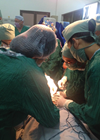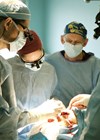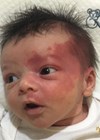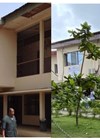The British Foundation for International Surgery and Training (BFIRST) marks their 10-year anniversary this year as an organisation. As the international outreach arm of the British Association of Plastic, Reconstructive & Aesthetic Surgeons (BAPRAS), BFIRST focuses on supporting surgeons in resource-poor countries to develop reconstructive surgical techniques that will be most relevant to their own environment.
The vision of BFIRST is primarily education; teaching others so that one day they can teach their own. UK-based plastic surgeons in resource-poor environments engage in a close partnership with local colleagues. The local doctor must co-lead on the project content and curriculum, and what’s more, the project must then empower and train the local multidisciplinary team. In this way, the specific learning needs of that population and hospital team are addressed. This model has been employed by the organisation across all projects undertaken across the last decade and has always been guided by a constant feedback loop with the local team, as their needs evolve over time. As we approach our next decade, our focus must also look towards making sure our global surgery efforts are sustainable.
What do we mean by sustainable global surgery?
Building sustainable global partnerships is at the heart of BFIRST’s vision. The brickwork for this is made up of several materials. We feel that the most crucial of these elements includes future-proofing what we teach – by helping host units build a service where the skills they learn can be used long-term and can be supported by the full complement of necessary multidisciplinary care. We also hold to great importance the concept of creating lasting relationships that outlive the length of the project, hopefully spanning generations and decades.
Building capacity for the future
Capacity building is crucial for host countries to be able to practise independently. This can be a complex task and has many different elements – from accruing equipment and hiring multidisciplinary staff to training and retaining the next generation of clinicians. This, naturally, can only take place over extended periods of time and requires sustained effort and commitment from host countries and sustained support from visiting surgeons, through repeated efforts across multiple visits.
Building present and future relationships
Lasting relationships are also imperative for sustainable surgical partnerships [2]. These are built not only through repeated visits to the same host country by the same visiting surgeons, but also by training the ’next generation’ of global surgeons. BFIRST feel that if we are to invest in the next generation of overseas surgeons, this must be reciprocated and propagated through UK surgical trainees.
In this way, both parties can move into their consultant careers with strongly weaved relationships and grow together. In all these ways, BFIRST aims to ensure a future for our global partnerships by inspiring the next generation of global surgeons early, regardless of the level of training. Surgeons and students can get involved with many activities at home that support global partnerships, cultivating their interest and giving them an aptitude for global surgery, that they may carry into future global partnerships.
While on a trip, although the training is consultant-delivered, the trainees are valuable members of global surgery teams as they can forge relationships with local trainees quickly, provide organisation and coordination to trips and patient data, and provide a unique set of skills to a consultant-led team [1]. From the host side, engaging local trainees is the key to effective surgical capacity building, as exemplified in BFIRST’s work in Tanzania and Cambodia.
Spotlight on a trip – Tanzania
Dar Es Salaam in Tanzania has been a focal point for BFIRST visits since 2019 [1]. These visits have evolved over time to address critical needs and forge meaningful, sustained partnerships. The 2023 visit marked a significant step forward, focusing on establishing formal collaborations with hospitals and gathering data to understand the demand for plastic and orthoplastic surgery training, so that a formal training programme can be established [3].
The introduction of surgical trainees brought a fresh, enthusiastic perspective to the project. Emma Murray and Terouz Pasha joined the team led by BFIRST Chair Naveen Cavale and a group of UK consultant plastic surgeons on the last two trips to Tanzania. The trainee role was as a conduit for knowledge transfer between experienced surgeons and local teams, enriching both sides with valuable knowledge and insights.

Edmund Fitzgerald O’Connor (centre) training surgeons at Tumbi Hopsital,
Dar es Salaam on one of the earliest trips to Tanzania.
This involvement in training local teams not only contributed to immediate improvements but also sets the foundation for long-term advancements in surgical expertise within Tanzania. Long-term connections between departments in the UK and in Tanzania are of paramount importance to the success of the project, and the continuation of these relationships may eventually rely on the senior surgeons who first visited as trainees.
In terms of capacity building for the future, on their most recent trip, progress was made with a prominent hospital, Comprehensive Community Based Rehabilitation Tanzania (CCBRT), in Dar Es Salaam. This contact laid the groundwork for future initiatives, with a specific emphasis on training. The vision is to utilise CCBRT to run postgraduate courses for local plastic surgeons, starting with fundamental plastic surgery techniques and progressing to the intricacies of microsurgery. BFIRST aims to develop a ‘train-the-trainer’ approach, which involves identifying surgeons who have excelled in the programme and equipping them with the skills and resources to continue training within the region.

Tanzania 2022: BFIRST trainees (left to right – Dr Moghim, Dr Pasha and Miss Murray)
and local trainees (Dr Anneth and Dr Alto) sharing their respective training experiences.
Spotlight on a trip – Cambodia
BFIRST’s Cambodia project is based in the Children’s Surgical Centre (CSC) in Phnom Penh. This project has been running as long as our organisation has been established, starting in 2013. The CSC’s vision strategy, “training of local surgeons . . . focusing on the development of sustainable surgical services for Cambodians”, is in perfect alignment with the goals of our organisation. BFIRST and more recently the British Society for Surgery of the Hand (BSSH), together with a team from Singapore elected to endorse this goal by creating a community-oriented curriculum for training local surgeons. Areas of need identified included brachial plexus injuries and congenital hand surgery, and so the training is focused on equipping local surgeons with these skillsets and making sure they pass it on.
In terms of building capacity for the future, the CSC is a great example. This project has worked through the key phases of facilitating local surgeons to provide their own service. Since 2013 they have worked through important cycles, from defining the community needs, designing a curriculum, delivering the curriculum, and refining this based on a feedback loop. The focus on the transfer of skills to the local team, within the constraints of their existing infrastructure, has seen local surgeons achieve independent competency in brachial plexus surgery, pedicled flaps and congenital hand surgery. This is supported too, by using IT to make surgical training catalogues in their own local language for references and teaching.

Mr Greg O’Toole, UK Consultant Plastic Surgeon (left) and Mr Lam (right), after a
surgical teaching session at the CSC one one of the earliest Cambodia trips.
Cambodia has also paved the way for establishing longevity in global partnerships, having had consistency in the visiting consultant team and having taken trainees on trips since the earliest years of the project. The team’s most recent trip in October 2023 led by Mr Wee Lam, Consultant Plastic and Hand Surgeon, consisted of six consultants and five surgical trainees from the UK and Singapore [4].
The UK plastic surgery trainees including Mr Benjamin Wood played a vital role in all aspects of the trip from planning, gathering resources, preparing for cases, attending clinic and theatre, teaching local staff, gathering data and more.

Cambodia 2023: Mr Lam (far left), along with Miss Sara Dorman, UK Consultant Orthopaedic Surgeon (front centre)
taking UK and local trainees Mr Wood, Dr Das De and Miss Puei Koh through an upper limb procedure.
Inspiring future global plastic surgeons from home
The BFIRST Medical Student Committee (BFIRST MSC) plays an important role in the sustainability of global surgery partnerships by cultivating an interest in global surgery early on in individual’s careers, nurturing the next generation of global reconstructive surgeons.
With universal evidence pointing towards the increasing need for surgical services worldwide, the BFIRST MSC recognises that a global perspective is imperative when preparing medical students for the future of our current healthcare landscape.
BFIRST MSC’ primary objective is to educate and create awareness, promoting a safe and responsible culture in delivering sustainable global reconstructive surgery. BFIRST MSC’s tackles this through UK-based activities, including informative webinars about BFIRST’s projects, a monthly newsletter, teaching sessions and fundraising events. This provides medical students a platform in which they can be curious and ask questions about global reconstructive surgery.
How to get involved at every level
BFIRST offers a myriad of avenues for plastic surgeons, trainees, and medical students to actively contribute to global healthcare initiatives. For consultants, the initial step involves reaching out via email to info@bfirst.org.uk or directly contacting the organisation’s chair at naveen.cavale@nhs.net. Consultants can also explore involvement through the BFIRST website, attending the annual ‘BFIRST Overseas Day’ event, or connecting on social media.
BFIRST welcomes consultants with existing humanitarian projects or innovative ideas for new ventures in resource-poor countries. Trainees can engage with BFIRST by subscribing to the trainee-specific newsletter and following social media channels. The organisation actively seeks to appoint trainees on overseas trips, encouraging them to evolve into the next generation of global plastic surgery consultants. The ‘Trips Matching Form’ is utilised to match trainees to trips and ensures fair selection, considering commitment, leadership, motivation, overseas experience, academic contributions, and a consultant reference.
Medical students can participate by subscribing to the medical student newsletter and following BFIRST MSC social media channels. Those seeking a more committed role can become regional representatives, gaining access to international research projects, essay competitions, and a vast network of professionals nationwide and beyond.
BFIRST stands as a gateway for professionals and aspiring healthcare leaders to contribute meaningfully to global plastic surgery initiatives, fostering collaboration, education, and positive impact.
References
1. Cavale N, Ahmed F, Din A, et al. BFIRST Tanzania Report September 2022. [Unpublished manuscript 2022].
2. Jedrzejko N, Margolick J, Nguyen JH, et al. A systematic review of global surgery partnerships and a proposed framework for sustainability. Can J Surg 2021;64(3):E280–8.
3. Murray E. BFIRST Tanzania Surgical Education Plan. [Unpublished manuscript 2023].
4. Wood B, Choong J. BFIRST Cambodia Mission 30th October – 3rd November Trip Report. [Unpublished manuscript 2023].
5. Lam L. Teaching Hand Surgery in Developing Countries – Study of a Successful Model in Cambodia (2016).
www.bssh.ac.uk/_userfiles/pages/files/
Bursaries%20and%20Grants/Pulvertaft
%20prize%20winners/Wee%20Lam.pdf
[Link last accessed April 2024].
Acknowledgments:
With special thanks to Emma Murray, Benjamin Wood and Jia Hui Choong for their contributions towards this article.
COMMENTS ARE WELCOME















